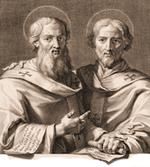Fathers of the Church
Epistle XXXIV: to Castorius, Notary
by Gregory the Great in 590-604 | translated by James Barmby, D.d
Gregory to Castorius, our notary at Ravenna.
When Florentinus, deacon of the Church of Ravenna, treated with us in behalf of our most reverend brother and fellow-bishop Marinianus concerning the use of the pallium, on our asking him what was the ancient custom, he replied that the bishop of the Church of Ravenna used the pallium in all litanies. But that this was not so we both learnt from others, and it appeared evidently from the letters of the former bishop John, which we shewed to him. But he said what he had been ordered to say. For, at the time when this same John was inhibited by thee from presuming to use the pallium out of order and unadvisedly, he wrote to us that the ancient custom had been this; that the bishop of that city should use the pallium in solemn litanies. We send thee, for thy information, copies of his letters. But when Adeodatus, deacon of the aforesaid Church, at the time when he was here, in like manner pressed us strongly concerning this use of the pallium, we, desiring to ascertain the truth, in like manner had him questioned as to what the custom was: and he, that he might persuade us to believe him, and succeed in obtaining from us what he sought, testified under oath that it had been the ancient custom for the bishop of his city to use the pallium in four or five solemn litanies. Let therefore thy Experience look to the matter diligently, and enquire with all carefulness how many solemn litanies there have been from ancient times. Take care also to make enquiry by calling them, not the solemn, but the greater litanies; that when, through what the aforesaid deacon Adeodatus testified to us and what the letter of the aforesaid bishop John acknowledges, it shall appear how many of these solemn litanies there were, we, knowing how often the pallium used to be worn in litanies, may most willingly grant the privilege. But do not make this enquiry of those who are put forward by the ecclesiastics, but of others whom you know to be impartial: and whatever after careful investigation you discover communicate to us with accuracy, that having ascertained the truth, as we have said, we may relieve the mind of our brother and fellow-bishop, the most reverend Marinianus.
Taken from "The Early Church Fathers and Other Works" originally published by Wm. B. Eerdmans Pub. Co. in English in Edinburgh, Scotland, beginning in 1867. (LNPF II/XII, Schaff and Wace). The digital version is by The Electronic Bible Society, P.O. Box 701356, Dallas, TX 75370, 214-407-WORD.






